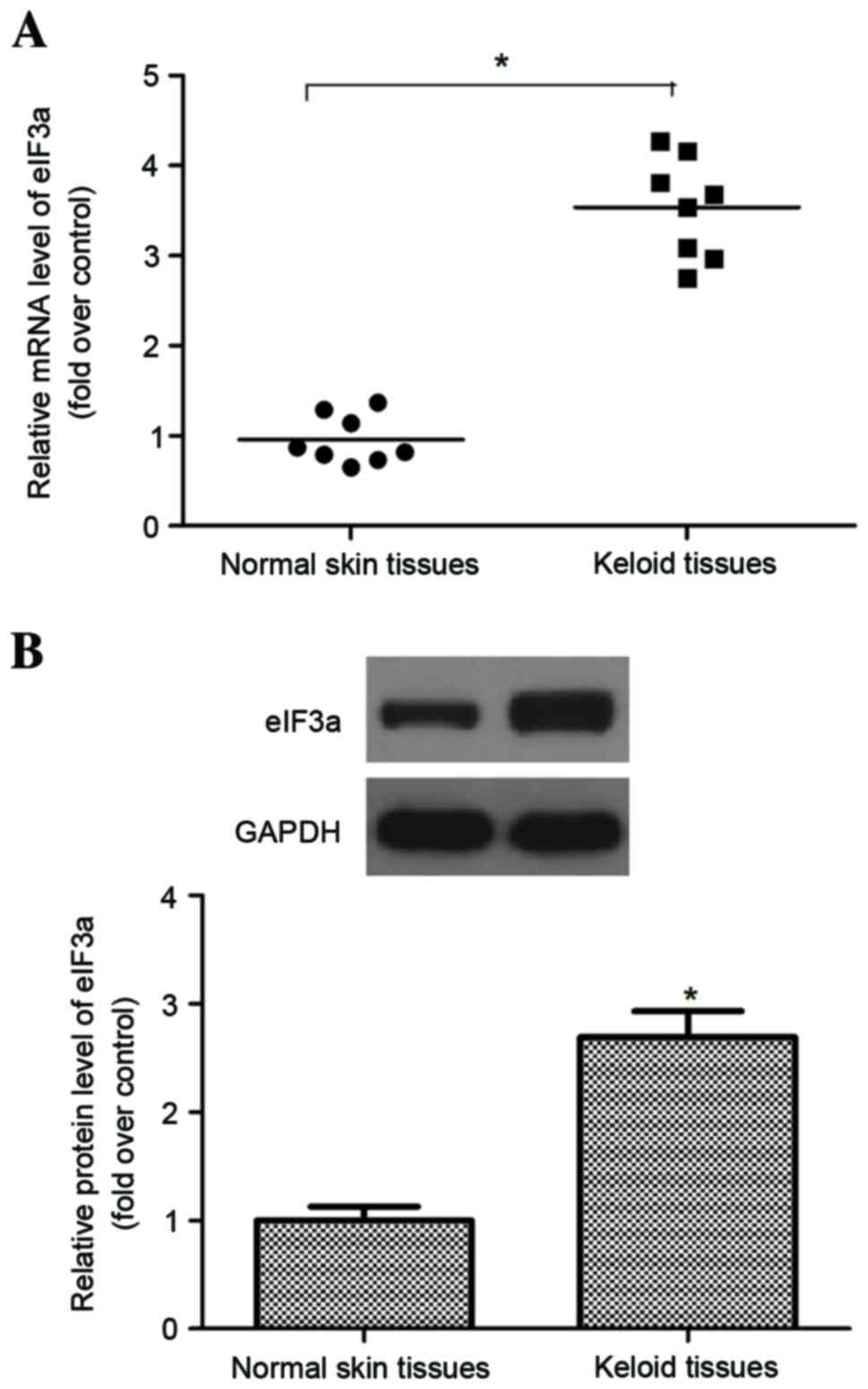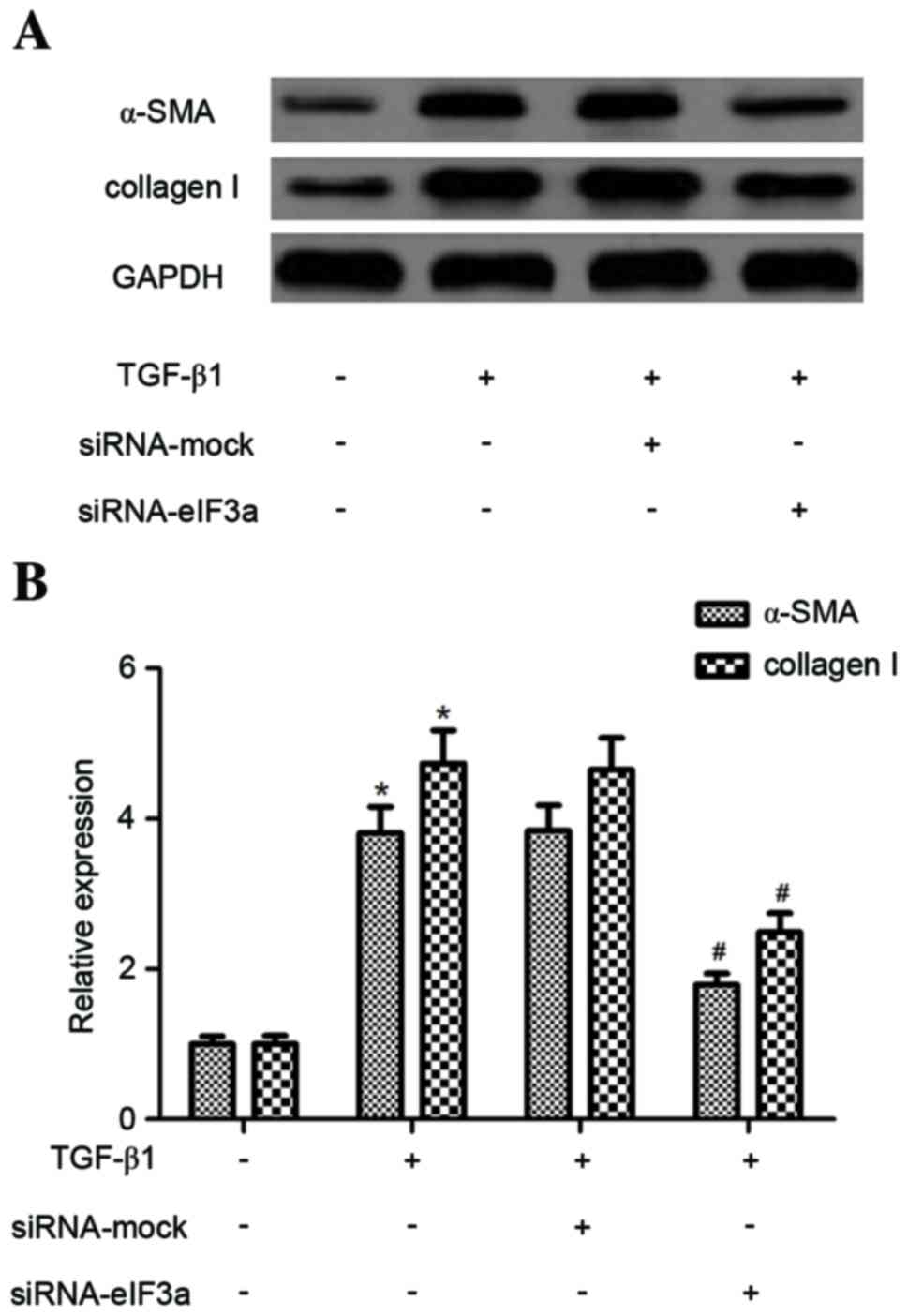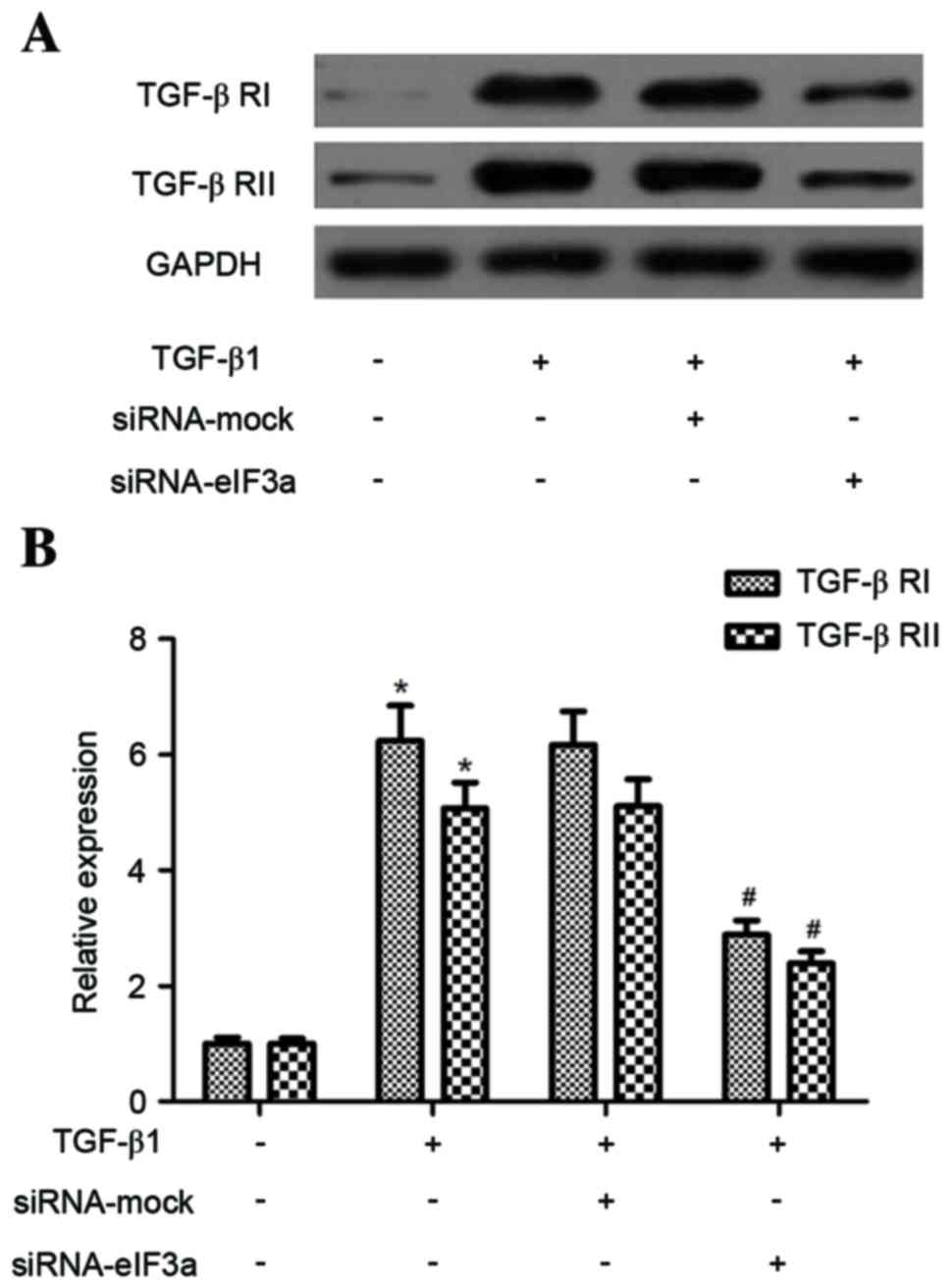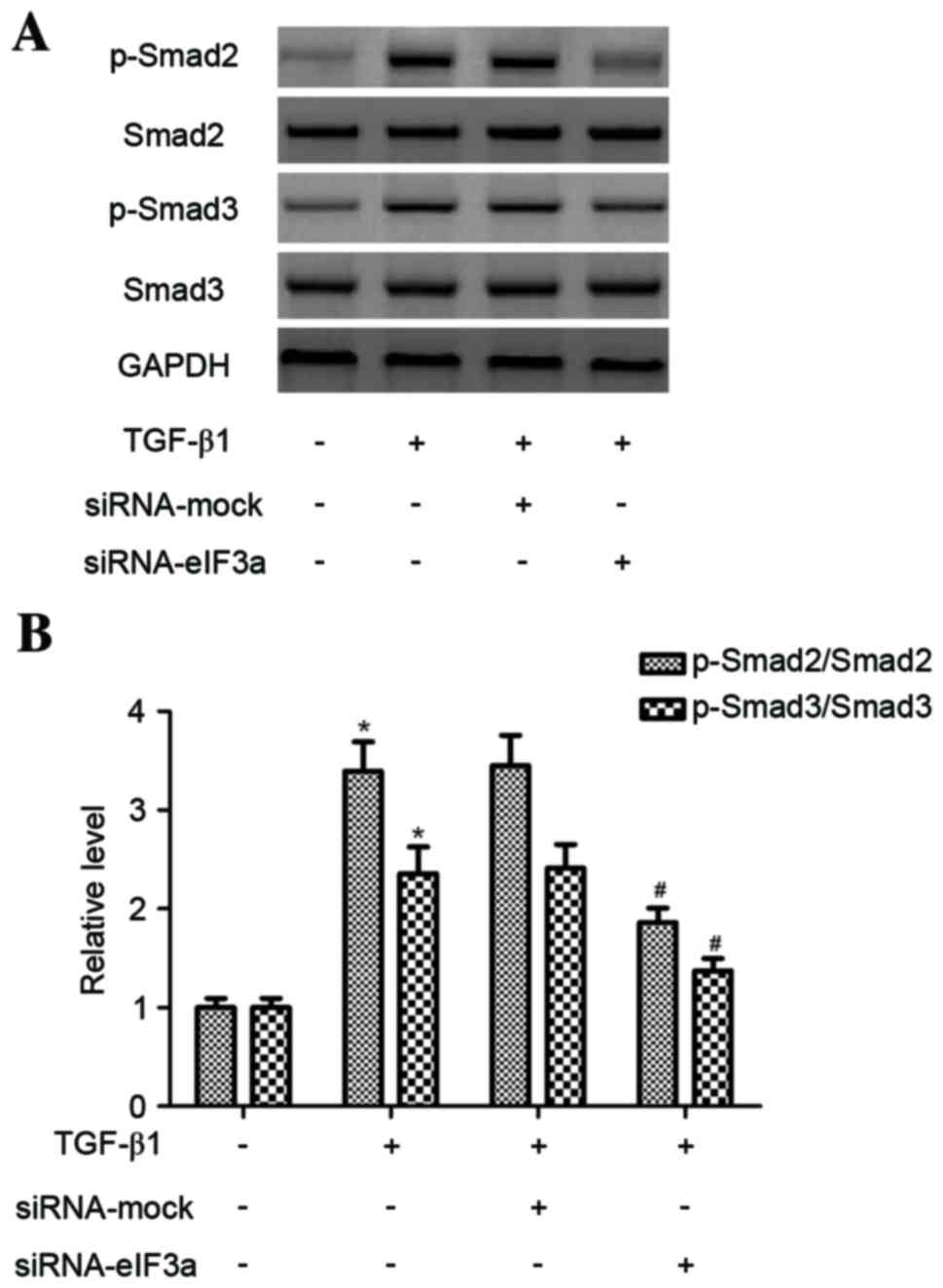|
1
|
Seifert O and Mrowietz U: Keloid scarring:
Bench and bedside. Arch Dermatol Res. 301:259–272. 2009. View Article : Google Scholar : PubMed/NCBI
|
|
2
|
English RS and Shenefelt PD: Keloids and
hypertrophic scars. Dermatol Surg. 25:631–638. 1999. View Article : Google Scholar : PubMed/NCBI
|
|
3
|
Gauglitz GG, Korting HC, Pavicic T,
Ruzicka T and Jeschke MG: Hypertrophic scarring and keloids:
Pathomechanisms and current and emerging treatment strategies. Mol
Med. 17:113–125. 2011. View Article : Google Scholar : PubMed/NCBI
|
|
4
|
Fang F, Huang RL, Zheng Y, Liu M and Huo
R: Bone marrow derived mesenchymal stem cells inhibit the
proliferative and profibrotic phenotype of hypertrophic scar
fibroblasts and keloid fibroblasts through paracrine signaling. J
Dermatol Sci. 83:95–105. 2016. View Article : Google Scholar : PubMed/NCBI
|
|
5
|
Wu CS, Wu PH, Fang AH and Lan CC: FK506
inhibits the enhancing effects of transforming growth factor
(TGF)-β1 on collagen expression and TGF-β/Smad signaling in keloid
fibroblasts: Implication for new therapeutic approach. Br J
Dermatol. 167:532–541. 2012. View Article : Google Scholar : PubMed/NCBI
|
|
6
|
Makino S, Mitsutake N, Nakashima M, Saenko
VA, Ohtsuru A, Umezawa K, Tanaka K, Hirano A and Yamashita S:
DHMEQ, a novel NF-kappaB inhibitor, suppresses growth and type I
collagen accumulation in keloid fibroblasts. J Dermatol Sci.
51:171–180. 2008. View Article : Google Scholar : PubMed/NCBI
|
|
7
|
Bran GM, Sommer UJ, Goessler UR, Hörmann
K, Riedel F and Sadick H: TGF-β1 antisense impacts the SMAD
signalling system in fibroblasts from keloid scars. Anticancer Res.
30:3459–3463. 2010.PubMed/NCBI
|
|
8
|
Chalmers RL: The evidence for the role of
transforming growth factor-beta in the formation of abnormal
scarring. Int Wound J. 8:218–223. 2011. View Article : Google Scholar : PubMed/NCBI
|
|
9
|
Peltonen J, Hsiao LL, Jaakkola S, Sollberg
S, Aumailley M, Timpl R, Chu ML and Uitto J: Activation of collagen
gene expression in keloids: Co-localization of type I and VI
collagen and transforming growth factor-beta 1 mRNA. J Invest
Dermatol. 97:240–248. 1991. View Article : Google Scholar : PubMed/NCBI
|
|
10
|
Chin GS, Liu W, Peled Z, Lee TY,
Steinbrech DS, Hsu M and Longaker MT: Differential expression of
transforming growth factor-beta receptors I and II and activation
of Smad 3 in keloid fibroblasts. Plast Reconstr Surg. 108:423–429.
2001. View Article : Google Scholar : PubMed/NCBI
|
|
11
|
Saletta F, Suryo Rahmanto Y and Richardson
DR: The translational regulator eIF3a: The tricky eIF3 subunit!
Biochim Biophys Acta 1806. 1–286. 2010.
|
|
12
|
Dong Z, Liu Z, Cui P, Pincheira R, Yang Y,
Liu J and Zhang JT: Role of eIF3a in regulating cell cycle
progression. Exp Cell Res. 315:1889–1894. 2009. View Article : Google Scholar : PubMed/NCBI
|
|
13
|
Liu Z, Dong Z, Yang Z, Chen Q, Pan Y, Yang
Y, Cui P, Zhang X and Zhang JT: Role of eIF3a (eIF3 p170) in
intestinal cell differentiation and its association with early
development. Differentiation. 75:652–661. 2007. View Article : Google Scholar : PubMed/NCBI
|
|
14
|
Zhang YF, Wang Q, Luo J, Yang S, Wang JL
and Li HY: Knockdown of elF3a inhibits collagen synthesis in renal
fibroblasts via Inhibition of transforming growth factor-β1/Smad
signaling pathway. Int Clin Exp Pathol. 8:8983–8989. 2015.
|
|
15
|
Ishihara H, Yoshimoto H, Fujioka M,
Murakami R, Hirano A, Fujii T, Ohtsuru A, Namba H and Yamashita S:
Keloid fibroblasts resist ceramide-induced apoptosis by
overexpression of insulin-like growth factor I receptor. J Invest
Dermatol. 115:1065–1071. 2000. View Article : Google Scholar : PubMed/NCBI
|
|
16
|
Livak KJ and Schmittgen TD: Analysis of
relative gene expression data using real-time quantitative PCR and
the 2(-Delta Delta C(T)) method. Methods. 25:402–408. 2001.
View Article : Google Scholar : PubMed/NCBI
|
|
17
|
Li XW, Wu YH, Li XH, Li D, Du J, Hu CP and
Li YJ: Role of eukaryotic translation initiation factor 3a in
bleomycin-induced pulmonary fibrosis. Eur J PharSmacol. 749:89–97.
2015. View Article : Google Scholar
|
|
18
|
Li WQ, Li XH, Wu YH, Du J, Wang AP, Li D
and Li YJ: Role of eukaryotic translation initiation factors 3a in
hypoxia-induced right ventricular remodeling of rats. Life Sci.
144:61–68. 2016. View Article : Google Scholar : PubMed/NCBI
|
|
19
|
Younai S, Nichter LS, Wellisz T, Reinisch
J, Nimni ME and Tuan TL: Modulation of collagen synthesis by
transforming growth factor-[beta] in keloid and hypertrophic scar
fibroblasts. Ann Plast Surg. 33:148–154. 1994. View Article : Google Scholar : PubMed/NCBI
|
|
20
|
Sidgwick G and Bayat A: Extracellular
matrix molecules implicated in hypertrophic and keloid scarring. J
Eur Acad Dermatol Venereol. 26:141–152. 2012. View Article : Google Scholar : PubMed/NCBI
|
|
21
|
Babu M, Diegelmann R and Oliver N: Keloid
fibroblasts exhibit an altered response to TGF-beta. J Invest
Dermatol. 99:650–655. 1992. View Article : Google Scholar : PubMed/NCBI
|
|
22
|
Fujiwara M, Muragaki Y and Ooshima A:
Keloid-derived fibroblasts show increased secretion of factors
involved in collagen turnover and depend on matrix
metalloproteinase for migration. Br J Dermatol. 153:295–300. 2005.
View Article : Google Scholar : PubMed/NCBI
|
|
23
|
Hsu YC, Chen MJ, Yu YM, Ko SY and Chang
CC: Suppression of TGF-β1/SMAD pathway and extracellular matrix
production in primary keloid fibroblasts by curcuminoids: Its
potential therapeutic use in the chemoprevention of keloid. Arch
Dermatol Res. 302:717–724. 2010. View Article : Google Scholar : PubMed/NCBI
|
|
24
|
Mun JH, Kim YM, Kim BS, Kim JH, Kim MB and
Ko HC: Simvastatin inhibits transforming growth factor-β1-induced
expression of type I collagen, CTGF, and α-SMA in keloid
fibroblasts. Wound Repair Regen. 22:125–133. 2014. View Article : Google Scholar : PubMed/NCBI
|
|
25
|
Hou Q, He WJ, Hao HJ, Han QW, Chen L, Dong
L, Liu JJ, Li X, Zhang YJ, Ma YZ, et al: The four-herb Chinese
medicine ANBP enhances wound healing and inhibits scar formation
via bidirectional regulation of transformation growth factor
pathway. PLoS One. 9:e1122742014. View Article : Google Scholar : PubMed/NCBI
|
|
26
|
Derynck R and Zhang YE: Smad-dependent and
Smad-independent pathways in TGF-beta family signalling. Nature.
425:577–584. 2003. View Article : Google Scholar : PubMed/NCBI
|
|
27
|
Phan TT, Lim IJ, Aalami O, Lorget F, Khoo
A, Tan EK, Mukhopadhyay A and Longaker MT: Smad3 signalling plays
an important role in keloid pathogenesis via epithelial-mesenchymal
interactions. J Pathol. 207:232–242. 2005. View Article : Google Scholar : PubMed/NCBI
|
|
28
|
Wang Z, Gao Z, Shi Y, Sun Y, Lin Z, Jiang
H, Hou T, Wang Q, Yuan X, Zhu X, et al: Inhibition of Smad3
expression decreases collagen synthesis in keloid disease
fibroblasts. J Plast Reconstr Aesthet Surg. 60:1193–1199. 2007.
View Article : Google Scholar : PubMed/NCBI
|



















